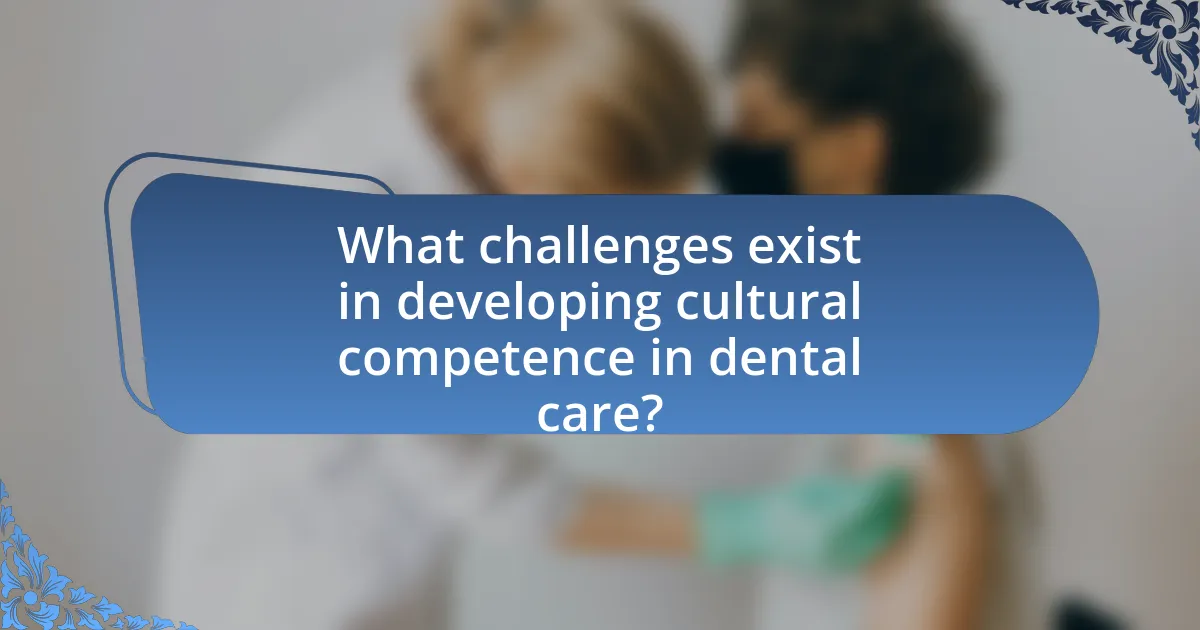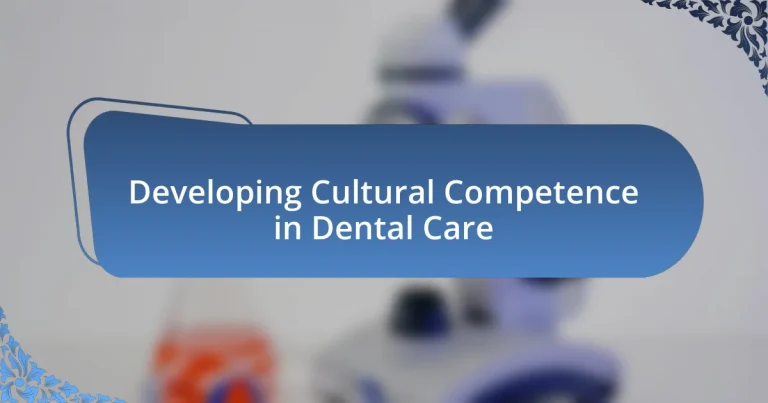Cultural competence in dental care is defined as the ability of dental professionals to effectively understand, communicate with, and interact with patients from diverse cultural backgrounds. This article outlines the significance of cultural competence in enhancing patient-provider communication, improving treatment outcomes, and reducing health disparities. Key components include awareness of cultural differences, effective communication strategies, and the importance of ongoing education and training. The article also discusses the challenges dental professionals face in achieving cultural competence, such as implicit biases and systemic issues, while providing practical steps and resources for enhancing cultural competence in dental practices.

What is Cultural Competence in Dental Care?
Cultural competence in dental care refers to the ability of dental professionals to understand, communicate with, and effectively interact with patients from diverse cultural backgrounds. This competence involves recognizing and respecting cultural differences in beliefs, practices, and values related to oral health. Research indicates that culturally competent care can lead to improved patient satisfaction, better health outcomes, and increased adherence to treatment plans, as it fosters trust and understanding between patients and providers.
Why is cultural competence important in dental care?
Cultural competence is important in dental care because it enhances patient-provider communication and improves treatment outcomes. When dental professionals understand and respect diverse cultural backgrounds, they can tailor their approaches to meet the specific needs of patients, leading to increased trust and satisfaction. Research indicates that culturally competent care reduces health disparities; for instance, a study published in the Journal of Dental Education found that culturally aware practitioners are more effective in addressing the unique concerns of minority populations, ultimately resulting in better oral health outcomes.
How does cultural competence impact patient outcomes?
Cultural competence significantly improves patient outcomes by enhancing communication, trust, and satisfaction between healthcare providers and patients. When dental care providers understand and respect diverse cultural backgrounds, they can tailor their approaches to meet individual patient needs, leading to better adherence to treatment plans and increased patient engagement. Research indicates that culturally competent care reduces health disparities; for instance, a study published in the Journal of Health Care for the Poor and Underserved found that culturally tailored interventions improved oral health outcomes among minority populations. This evidence underscores the importance of cultural competence in fostering effective patient-provider relationships and ultimately improving health results.
What role does cultural competence play in patient satisfaction?
Cultural competence significantly enhances patient satisfaction by fostering effective communication and understanding between healthcare providers and patients from diverse backgrounds. When dental care professionals demonstrate cultural competence, they are better equipped to address the unique needs, preferences, and values of their patients, leading to improved trust and rapport. Research indicates that culturally competent care can result in higher patient satisfaction scores, as patients feel respected and understood, which is crucial for their overall experience in healthcare settings. For instance, a study published in the Journal of Health Care for the Poor and Underserved found that patients who perceived their providers as culturally competent reported greater satisfaction with their care and were more likely to adhere to treatment recommendations.
What are the key components of cultural competence in dental care?
The key components of cultural competence in dental care include awareness of cultural differences, effective communication, and the ability to provide culturally appropriate care. Awareness of cultural differences allows dental professionals to recognize and respect diverse beliefs and practices related to oral health. Effective communication involves using language and terminology that patients understand, which may include the use of interpreters or culturally relevant materials. Providing culturally appropriate care means tailoring treatment plans to align with patients’ cultural values and preferences, ensuring that care is respectful and relevant. These components are essential for improving patient satisfaction and health outcomes in diverse populations.
What knowledge is essential for dental professionals to develop cultural competence?
Dental professionals must acquire knowledge of diverse cultural beliefs, practices, and values to develop cultural competence. This understanding enables them to effectively communicate and provide care that respects patients’ cultural backgrounds. Research indicates that cultural competence training improves patient satisfaction and health outcomes, as evidenced by a study published in the Journal of Dental Education, which found that culturally competent care leads to better patient-provider relationships and adherence to treatment plans.
How do attitudes and beliefs influence cultural competence in dental practice?
Attitudes and beliefs significantly influence cultural competence in dental practice by shaping how dental professionals perceive and interact with diverse patient populations. Positive attitudes towards cultural diversity foster open communication and empathy, which are essential for understanding patients’ unique backgrounds and needs. Conversely, negative beliefs or biases can lead to misunderstandings and inadequate care, ultimately affecting patient outcomes. Research indicates that dental practitioners who engage in cultural competence training demonstrate improved patient satisfaction and treatment adherence, highlighting the importance of addressing personal attitudes and beliefs in enhancing cultural competence.
How can dental professionals assess their cultural competence?
Dental professionals can assess their cultural competence through self-reflection, patient feedback, and participation in cultural competence training programs. Self-reflection allows dental professionals to evaluate their own biases and assumptions regarding diverse patient populations. Patient feedback provides insights into how well practitioners understand and meet the cultural needs of their patients, which can be gathered through surveys or direct communication. Additionally, engaging in cultural competence training programs equips dental professionals with the necessary skills and knowledge to effectively interact with patients from various cultural backgrounds, thereby enhancing their overall competence. Studies indicate that ongoing education in cultural competence significantly improves patient satisfaction and treatment outcomes, reinforcing the importance of these assessment methods.
What tools and frameworks are available for self-assessment?
Tools and frameworks available for self-assessment in developing cultural competence in dental care include the Cultural Competence Assessment Tool (CCAT), the Intercultural Development Inventory (IDI), and the Cultural Awareness Scale (CAS). The CCAT provides a structured approach for healthcare professionals to evaluate their cultural competence, focusing on knowledge, attitudes, and skills. The IDI measures an individual’s intercultural sensitivity and development, offering insights into areas for growth. The CAS assesses awareness of cultural differences and their impact on patient care. These tools are validated through research, demonstrating their effectiveness in enhancing cultural competence among dental care providers.
How can feedback from patients enhance cultural competence?
Feedback from patients can enhance cultural competence by providing insights into their unique experiences and needs, which helps healthcare providers tailor their services accordingly. When patients share their perspectives, it allows dental professionals to identify cultural barriers and biases that may affect care delivery. For instance, a study published in the Journal of Dental Education found that incorporating patient feedback led to improved communication strategies and increased satisfaction among diverse patient populations. This evidence demonstrates that actively seeking and integrating patient feedback fosters a more culturally responsive healthcare environment, ultimately leading to better patient outcomes.
What strategies can be implemented to improve cultural competence in dental care?
To improve cultural competence in dental care, dental professionals can implement strategies such as ongoing cultural competence training, incorporating diverse patient perspectives into care practices, and utilizing interpreters for effective communication. Ongoing training ensures that dental staff are aware of cultural differences and biases, which can enhance patient interactions and treatment outcomes. Incorporating diverse patient perspectives allows for tailored care that respects individual cultural beliefs and practices, leading to increased patient satisfaction. Utilizing interpreters addresses language barriers, ensuring that patients fully understand their treatment options and can communicate their needs effectively. These strategies are supported by research indicating that culturally competent care improves patient trust and adherence to treatment plans, ultimately leading to better health outcomes.
How can ongoing education and training enhance cultural competence?
Ongoing education and training enhance cultural competence by providing dental professionals with the knowledge and skills necessary to understand and respect diverse cultural backgrounds. This continuous learning process equips practitioners with insights into various cultural beliefs, practices, and communication styles, which are crucial for effective patient interactions. Research indicates that culturally competent care can lead to improved patient satisfaction and health outcomes, as evidenced by a study published in the Journal of Dental Education, which found that training in cultural competence significantly improved dental students’ ability to engage with patients from different backgrounds. By integrating ongoing education and training into their practice, dental professionals can better address the unique needs of their diverse patient populations, ultimately fostering a more inclusive healthcare environment.
What role do community partnerships play in developing cultural competence?
Community partnerships play a crucial role in developing cultural competence by facilitating collaboration between healthcare providers and diverse populations. These partnerships enable dental care professionals to gain insights into the cultural beliefs, practices, and needs of various communities, which enhances their ability to provide culturally sensitive care. For instance, partnerships with local organizations can lead to tailored health education programs that address specific cultural barriers to dental care, thereby improving access and outcomes. Research indicates that community engagement in healthcare settings leads to better patient-provider communication and increased trust, which are essential components of cultural competence.

What challenges exist in developing cultural competence in dental care?
Developing cultural competence in dental care faces several challenges, primarily including a lack of training, language barriers, and varying cultural beliefs about health. Dental professionals often receive insufficient education on cultural competence during their training, which limits their ability to effectively communicate and understand diverse patient needs. Language barriers can hinder effective patient-provider communication, leading to misunderstandings and inadequate care. Additionally, differing cultural beliefs regarding oral health and treatment can create conflicts between dental providers and patients, complicating the delivery of care. These challenges highlight the need for enhanced training and resources to improve cultural competence in dental settings.
What barriers do dental professionals face in achieving cultural competence?
Dental professionals face several barriers in achieving cultural competence, including lack of training, language differences, and limited understanding of diverse cultural practices. Research indicates that many dental schools do not incorporate sufficient cultural competence training into their curricula, which results in professionals feeling unprepared to address the needs of diverse patient populations. Additionally, language barriers can hinder effective communication, leading to misunderstandings and reduced quality of care. Furthermore, a limited awareness of cultural beliefs and practices can prevent dental professionals from providing appropriate and respectful care, ultimately impacting patient satisfaction and health outcomes.
How can implicit biases affect the delivery of dental care?
Implicit biases can negatively impact the delivery of dental care by influencing clinicians’ perceptions and treatment decisions based on patients’ race, ethnicity, or socioeconomic status. Research indicates that these biases can lead to disparities in pain management, treatment recommendations, and overall patient-provider communication. For instance, a study published in the Journal of the American Dental Association found that minority patients often receive less effective pain management compared to their white counterparts, highlighting how implicit biases can result in unequal care. This evidence underscores the importance of addressing implicit biases to ensure equitable dental care for all patients.
What systemic issues hinder cultural competence in dental practices?
Systemic issues that hinder cultural competence in dental practices include inadequate training, lack of diversity among dental professionals, and insufficient resources for addressing cultural differences. Inadequate training results in dental practitioners not being equipped with the necessary skills to understand and respect diverse cultural backgrounds, which can lead to misunderstandings and ineffective patient care. The lack of diversity among dental professionals limits the perspectives and experiences that can inform culturally competent practices, as a homogenous workforce may not fully grasp the needs of varied patient populations. Additionally, insufficient resources, such as language interpretation services and culturally relevant educational materials, further exacerbate the challenges in providing culturally competent care, as these resources are essential for effective communication and understanding between dental providers and patients from different cultural backgrounds.
How can dental practices overcome these challenges?
Dental practices can overcome challenges in developing cultural competence by implementing targeted training programs for staff. These programs should focus on enhancing understanding of diverse cultural backgrounds, communication styles, and patient needs. Research indicates that culturally competent care improves patient satisfaction and health outcomes, as evidenced by a study published in the Journal of Dental Education, which found that practices with cultural competence training reported a 30% increase in patient trust and engagement. By prioritizing education and awareness, dental practices can effectively address barriers to care and foster a more inclusive environment for all patients.
What best practices can be adopted to address barriers to cultural competence?
To address barriers to cultural competence in dental care, best practices include implementing ongoing cultural competence training for dental professionals. This training should focus on understanding diverse cultural backgrounds, communication styles, and health beliefs, which are essential for effective patient interactions. Research indicates that culturally competent care can lead to improved patient satisfaction and health outcomes, as evidenced by a study published in the Journal of Dental Education, which found that training significantly enhanced providers’ ability to engage with patients from various cultural backgrounds. Additionally, integrating diverse staff members who reflect the community’s demographics can foster a more inclusive environment, further bridging cultural gaps in care delivery.
How can leadership in dental practices foster a culture of competence?
Leadership in dental practices can foster a culture of competence by prioritizing continuous education and training for staff. By implementing regular training sessions and workshops, leaders ensure that team members stay updated on the latest dental techniques and technologies, which enhances their skills and knowledge. Research indicates that practices with ongoing professional development programs report higher levels of employee satisfaction and improved patient outcomes, as staff feel more competent and confident in their abilities. Additionally, leaders can promote a culture of open communication, encouraging team members to share knowledge and best practices, which further cultivates a competent workforce.

What are the benefits of developing cultural competence in dental care?
Developing cultural competence in dental care enhances patient-provider communication, leading to improved patient satisfaction and treatment outcomes. When dental professionals understand and respect diverse cultural backgrounds, they can tailor their approaches to meet individual patient needs, which fosters trust and encourages patients to seek care. Research indicates that culturally competent care can reduce health disparities; for instance, a study published in the Journal of Dental Education found that culturally competent training for dental students improved their ability to provide care to diverse populations, resulting in better patient engagement and adherence to treatment plans.
How does cultural competence enhance patient-provider relationships?
Cultural competence enhances patient-provider relationships by fostering trust and improving communication. When healthcare providers understand and respect diverse cultural backgrounds, they can tailor their interactions to meet patients’ unique needs, leading to increased patient satisfaction and adherence to treatment plans. Research indicates that culturally competent care reduces health disparities; for instance, a study published in the Journal of Health Care for the Poor and Underserved found that culturally competent practices significantly improved patient engagement and outcomes among minority populations. This alignment between provider and patient perspectives ultimately strengthens the therapeutic alliance, facilitating better health outcomes.
What impact does cultural competence have on treatment adherence?
Cultural competence significantly enhances treatment adherence by fostering trust and understanding between healthcare providers and patients. When providers demonstrate awareness and respect for a patient’s cultural background, patients are more likely to engage in their treatment plans. Research indicates that culturally competent care can lead to improved communication, which is essential for patient education and motivation. For instance, a study published in the Journal of Health Care for the Poor and Underserved found that culturally tailored interventions increased adherence rates among minority populations by 30%. This evidence underscores the critical role cultural competence plays in promoting effective treatment adherence.
How can cultural competence lead to improved health equity in dental care?
Cultural competence can lead to improved health equity in dental care by enabling providers to understand and address the diverse needs of patients from various backgrounds. When dental professionals are culturally competent, they can effectively communicate with patients, build trust, and tailor treatment plans that respect cultural beliefs and practices. Research indicates that culturally competent care reduces barriers to access and improves patient satisfaction, which is essential for achieving equitable health outcomes. For instance, a study published in the Journal of Dental Education found that culturally competent training for dental students significantly improved their ability to engage with diverse populations, ultimately leading to better health equity in dental services.
What are the long-term benefits for dental practices that prioritize cultural competence?
Dental practices that prioritize cultural competence experience enhanced patient satisfaction, improved health outcomes, and increased patient retention. By understanding and respecting diverse cultural backgrounds, dental professionals can tailor their communication and treatment approaches, leading to a more trusting patient-provider relationship. Research indicates that culturally competent care reduces health disparities; for instance, a study published in the Journal of Health Care for the Poor and Underserved found that culturally tailored interventions significantly improved patient adherence to treatment plans. Additionally, practices that embrace cultural competence often see a boost in referrals, as satisfied patients are more likely to recommend the practice to others within their communities.
How can cultural competence contribute to practice growth and reputation?
Cultural competence can significantly enhance practice growth and reputation by fostering trust and improving patient satisfaction. When dental practices demonstrate an understanding of diverse cultural backgrounds, they create an inclusive environment that attracts a broader patient base. Research indicates that culturally competent care leads to better health outcomes, as patients are more likely to engage in treatment when they feel understood and respected. For instance, a study published in the Journal of Dental Education found that practices that prioritize cultural competence experience higher patient retention rates and referrals, directly correlating to increased revenue and a stronger reputation in the community.
What role does cultural competence play in reducing health disparities?
Cultural competence plays a crucial role in reducing health disparities by enabling healthcare providers to understand and effectively respond to the diverse cultural needs of patients. This understanding fosters better communication, builds trust, and enhances patient engagement, which are essential for delivering equitable healthcare. Research indicates that culturally competent care can lead to improved health outcomes, as evidenced by a study published in the Journal of Health Care for the Poor and Underserved, which found that culturally tailored interventions significantly reduced disparities in health access and outcomes among minority populations. By addressing cultural differences, healthcare systems can mitigate barriers to care, ultimately leading to more equitable health services.
What practical steps can dental professionals take to enhance their cultural competence?
Dental professionals can enhance their cultural competence by engaging in ongoing education and training focused on cultural awareness and sensitivity. This includes attending workshops, seminars, and courses that address diverse cultural practices, beliefs, and communication styles relevant to dental care. Research indicates that culturally competent care improves patient satisfaction and health outcomes, as evidenced by a study published in the Journal of Dental Education, which found that training in cultural competence significantly increased dental students’ understanding of diverse patient needs. Additionally, dental professionals should actively seek feedback from patients about their experiences and perceptions, allowing for continuous improvement in culturally responsive practices.
How can dental professionals engage with diverse communities effectively?
Dental professionals can engage with diverse communities effectively by implementing culturally competent practices that respect and understand the unique backgrounds of patients. This involves actively seeking to learn about the cultural beliefs, values, and health practices of different communities, which can enhance communication and trust. Research indicates that culturally competent care leads to improved patient satisfaction and health outcomes, as evidenced by a study published in the Journal of Dental Education, which found that dental students who received training in cultural competence demonstrated better patient interactions and understanding of diverse needs. By fostering an inclusive environment and utilizing interpreters or community liaisons when necessary, dental professionals can ensure that all patients feel valued and understood, ultimately improving access to dental care for underrepresented populations.
What resources are available for continuous learning in cultural competence?
Resources available for continuous learning in cultural competence include online courses, workshops, and professional organizations. Online platforms such as Coursera and edX offer courses specifically focused on cultural competence, often developed by universities and experts in the field. Workshops conducted by organizations like the National Multicultural Conference and Summit provide hands-on training and networking opportunities. Additionally, professional organizations such as the American Dental Association and the American Association of Public Health Dentistry offer resources, webinars, and publications that focus on cultural competence in dental care. These resources are essential for dental professionals seeking to enhance their understanding and skills in providing culturally competent care.


